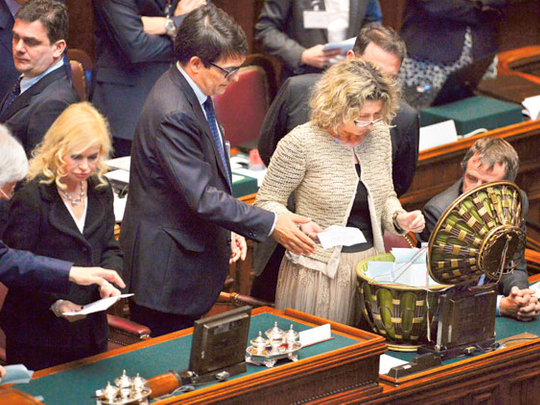
Rome: Italy’s parliament failed to elect a new president during a first round of voting on Thursday in a ballot that many hope will herald the end of a two-month impasse over a new government but is threatening to divide the centre-left.
In a last-minute agreement on Wednesday, Italy’s two main political blocs had agreed to back Franco Marini, a pipe-smoking 80-year-old seen as having formidable political skills.
The deal was seen as highly controversial by many across the political spectrum, with rebel voters preferring Stefano Rodota, a widely respected 79-year-old human rights advocate.
None of the candidates managed to win the necessary two-thirds support in the first round of voting, and parliament will return to the ballot at 13.30 GMT.
Leftist leader Pier Luigi Bersani’s bid to clinch a deal with Silvio Berlusconi’s People of Freedom party for Marini - a candidate with little public support or international standing - infuriated many within his Democratic Party.
Whoever the lawmakers elect will face the unenviable task of trying to bring the bickering parties together to break a deadlock that has raised fears of instability in the Eurozone’s third-largest economy.
“Franco Marini is the candidate best-placed to achieve the greatest consensus,” Bersani said, while Berlusconi - a scandal-tainted former prime minister who remains a potent force in Italian politics - described Marini as “a positive and serious person”.
Marini is a former Christian Democrat and ex-leader of the Catholic CISL trade union, who was speaker of the senate between 2006 and 2008.
But dissidents in Bersani’s party - led by 38-year-old Florence mayor Matteo Renzi - had said they will not vote for such an establishment figure.
- Increasingly desperate pleas for consensus -
Beppe Grillo, a former comedian who heads the anti-establishment Five Star Movement party, derided the choice as a “dodgy deal” between left and right.
He told AFP in an interview that Marini’s election “would be a disaster” and said Berlusconi supported him only because he believed Marini would protect him from two ongoing trials against him.
Grillo’s movement put forward Rodota as candidate, and hundreds of protesters held a demonstration outside the presidential palace on Thursday, calling for the respected academic to be given the post.
The outcome of the ballots is far from clear because the vote is secret and lawmakers sometimes do not follow their party leadership.
Other names in the rumour mill have included three former prime ministers - Giuliano Amato, Massimo D’Alema and Romano Prodi - as well as former European commissioner and veteran human rights campaigner Emma Bonino.
The voting to elect a successor to President Giorgio Napolitano brings together both chambers of the Italian parliament as well as regional representatives, with a total of 1,007 people eligible to vote.
A candidate must be supported by a two-thirds majority in the first three rounds of voting or by a simple majority from the fourth vote onwards.
In the first round of voting, Marini snapped up 521 votes, while Rodota won 240.
There are two votes per day, so the process could take several days.
The centre-left won elections in February by a narrow margin that failed to give it a parliamentary majority. Bersani has since tried to woo lawmakers from the Five Star Movement by adopting many of their aims, but has been rebuffed.
He has so far ruled out the most obvious alternative - a grand coalition with Berlusconi - which would prove hugely controversial among left-wingers.
Berlusconi has said there should be new elections if there is no deal, and polls indicate he would win, although still without the required majority.
While the presidency in Italy is a mostly ceremonial post, it takes on critical importance during times of political crisis, as shown by Napolitano’s manoeuvring to put Mario Monti in power when Berlusconi was ousted in 2011.
The 87-year-old Napolitano’s hands were tied as he attempted to steer negotiations between the parties after the February vote, since he was constitutionally prevented from calling elections in the last six months of his seven-year mandate.
His successor will have full powers to hold this out as a threat.
Big business, trade unions and the Roman Catholic Church have issued increasingly desperate pleas to politicians to set their differences aside as the country endures its worst recession since the post-war period.
Giorgio Squinzi, who leads the main employers’ association Confindustria, has warned of a rise in bankruptcies and said the political crisis had already cost the economy around 1.0 per cent in gross domestic product (GDP).
Financial markets have remained relatively muted as the deadlock has dragged on, however, although the prospect of repeat elections has been a growing concern.












